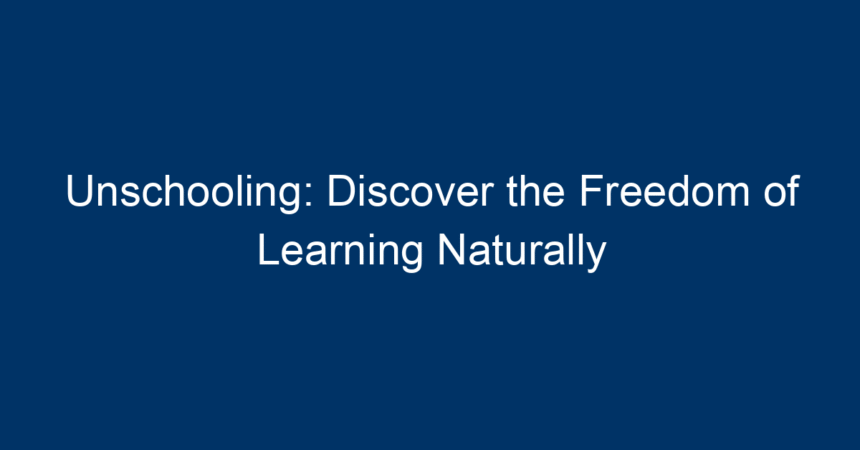In a world where standardized education often seems to stifle creativity, unschooling emerges as a fresh and liberating alternative. This approach to learning prioritizes the interests, curiosities, and abilities of each individual child, enabling them to take charge of their educational journey. If you’re searching for a more organic, freedom-filled way of learning, understanding unschooling might just ignite a passion for exploration in your life or your child’s.
What is Unschooling?
Unschooling is an educational philosophy that promotes self-directed learning and encourages children to pursue their interests at their own pace. Unlike traditional schooling, where a fixed curriculum dictates the learning path, unschooling allows for a more flexible approach. Children learn through everyday experiences, whether at home, in the community, or through travel and play. This style nurtures critical thinking, problem-solving skills, and a love of learning.
The Origins of Unschooling
The term unschooling was popularized by educational reformer John Holt in the 1970s. Holt advocated for an educational system that was more aligned with how children naturally learn. His belief was simple: children are inherently curious, and education should be an extension of that curiosity rather than a barrier. Over the decades, this philosophy has gained traction as parents look for ways to provide a more holistic education that respects individual learning styles.
The Key Principles of Unschooling
Understanding the principles of unschooling helps clarify how this educational approach differs from traditional schooling. Here are some foundational aspects:
1. Child-Led Learning
In unschooling, children direct their own education. This means they have the freedom to explore subjects that genuinely interest them, allowing for deeper engagement and understanding. This method fosters motivation and joy in learning, as kids are not forced to study topics that don’t resonate with them.
2. Real-World Education
Unschooling emphasizes learning from everyday life. Activities like cooking, gardening, shopping, and community service can be incredible learning opportunities that reinforce skills such as mathematics, science, and social studies. These experiences are often more impactful than traditional classroom settings.
3. Flexibility and Adaptability
The unschooling approach is flexible and can be tailored to individual needs. Parents and guardians can adapt resources and activities to suit their child’s developmental stage and interests. This adaptability enhances the learning experience, making it relevant and meaningful.
4. Trusting the Learner
Key to unschooling is the belief that children will naturally learn what they need to know when they are ready. This requires a high level of trust in the child’s instincts and abilities. Parents play a supportive role by providing resources, guidance, and encouragement rather than imposing strict structures and rules.
Benefits of Unschooling
Unschooling offers a wealth of benefits, making it an attractive option for many families. Here are some of the most notable advantages:
1. Fostering Independence
One of the core benefits of unschooling is the promotion of independence. Children learn to make choices, set goals, and pursue their interests, cultivating a sense of responsibility for their education.
2. Enhancing Creativity
Without the constraints of a rigid curriculum, children can think outside the box and explore new ideas. This fosters creativity and innovative thinking—skills that are invaluable in today’s ever-changing world.
3. Building Stronger Relationships
Unschooling often encourages families to spend more time together. Parents can engage with their children in learning activities, leading to stronger bonds and better communication. This shared experience can foster a supportive and nurturing environment.
4. Developing Lifelong Learning Skills
By encouraging children to pursue their interests, unschooling helps cultivate a love of lifelong learning. This intrinsic motivation may lead to adults who are continuously seeking knowledge and personal growth.
Challenges of Unschooling
While unschooling offers numerous benefits, it’s not without its challenges. Understanding these hurdles can help families navigate the transition:
1. Societal Perceptions
One of the biggest challenges unschoolers face is societal pressure. Many people may not understand the philosophy or may question its validity. This can lead to feelings of isolation or judgment from friends, family, and the community.
2. Lack of Structure
Some children thrive in structured environments, and the lack of a formal curriculum can be overwhelming for certain learners. It’s important for parents to strike a balance, providing guidance while allowing freedom.
3. Resource Availability
Unschooling often requires parents to be heavily involved in their child’s education, which can be time-consuming. Access to resources and opportunities may vary, making it challenging for some families.
How to Get Started with Unschooling
Transitioning to an unschooling approach can be a transformative journey. Here are some actionable steps to consider:
1. Assess Your Current Educational Approach
Begin by evaluating your current educational style. What aspects of traditional learning do you value, and what would you like to change? This reflection can help clarify your goals for unschooling.
2. Encourage Exploration
Create an environment that fosters exploration. Provide a range of materials—books, art supplies, and tools for hands-on learning. Encourage your children to ask questions and seek answers in creative ways.
3. Connect with the Community
Seek out local or online unschooling groups for support, encouragement, and resources. Sharing experiences with like-minded families can provide valuable insights and build a sense of community.
4. Be Patient and Flexible
The unschooling process is not linear; expect challenges and setbacks along the way. Allow yourself and your children to adapt and grow through this educational journey. Patience and flexibility are key.
5. Celebrate Learning
Take time to acknowledge and celebrate the learning experiences you and your child share. Whether it’s a new skill acquired or a project completed, recognizing achievements can motivate and inspire further exploration.
Conclusion: Embrace the Freedom of Unschooling
Unschooling is more than an educational philosophy; it’s a powerful movement that champions freedom, creativity, and love for learning. By prioritizing the individual needs of each child, unschooling fosters a nurturing and enriching environment where natural curiosity flourishes.
If you’re intrigued by the possibilities of unschooling, take the first step today. Embrace a world of exploration and discovery, and witness the joy of learning unfold in your life or your child’s. With patience, support, and a spirit of adventure, you can create a unique educational journey that honors the innate desire to learn and grow.




